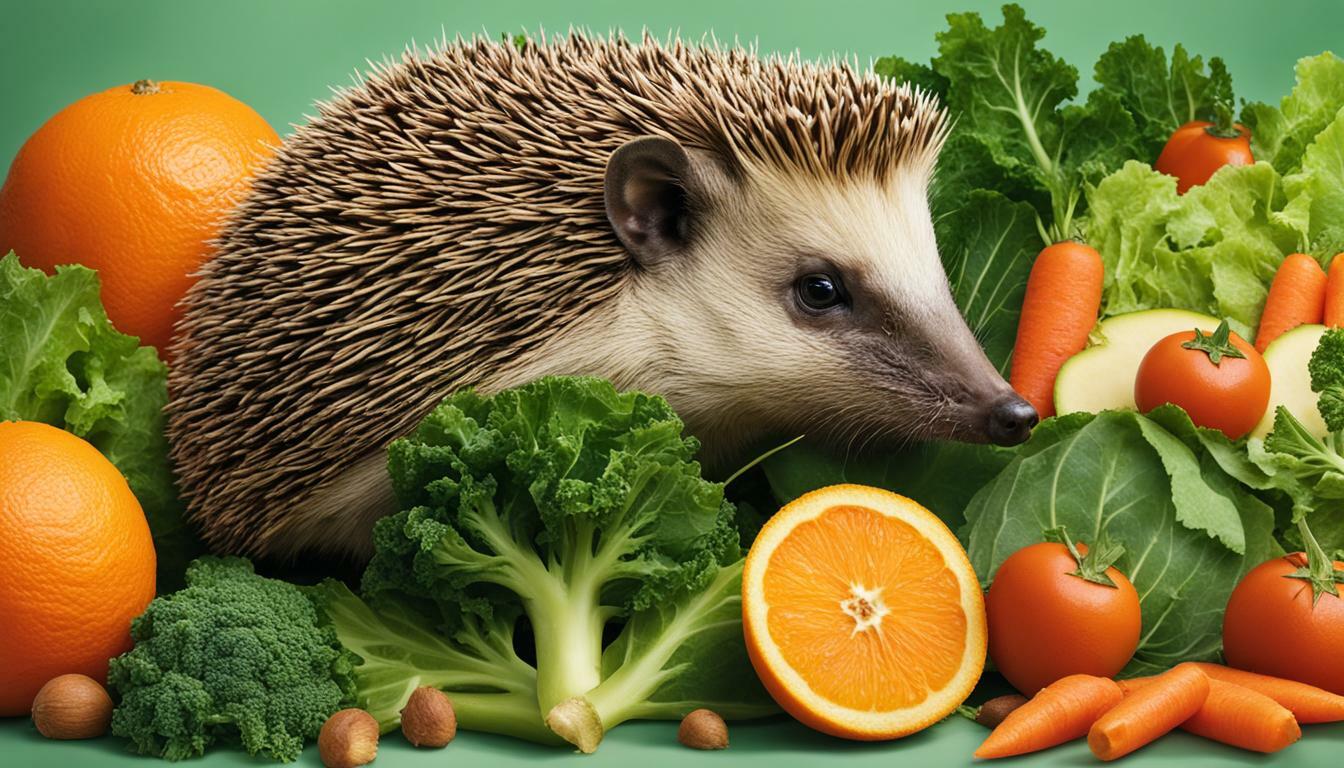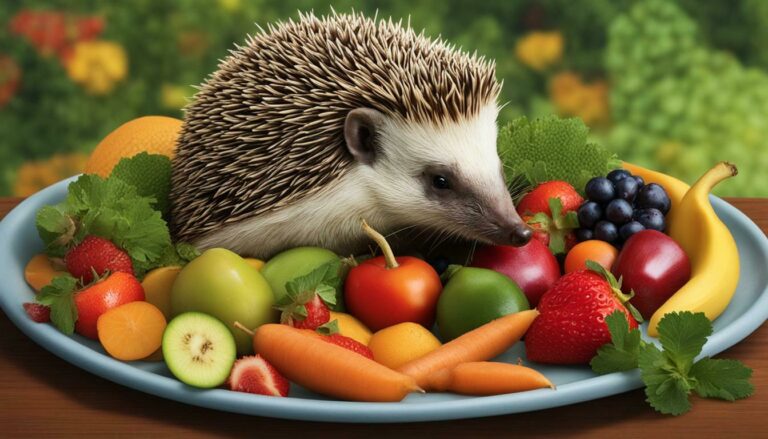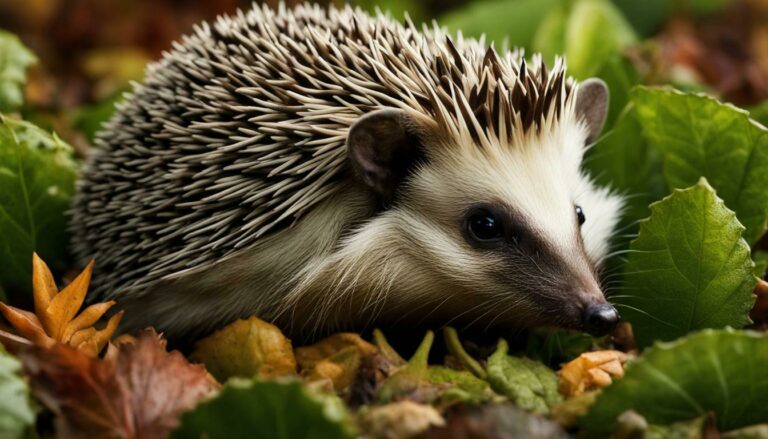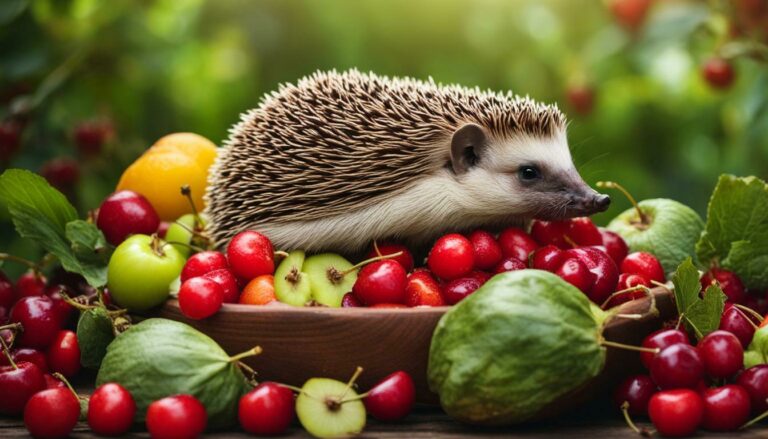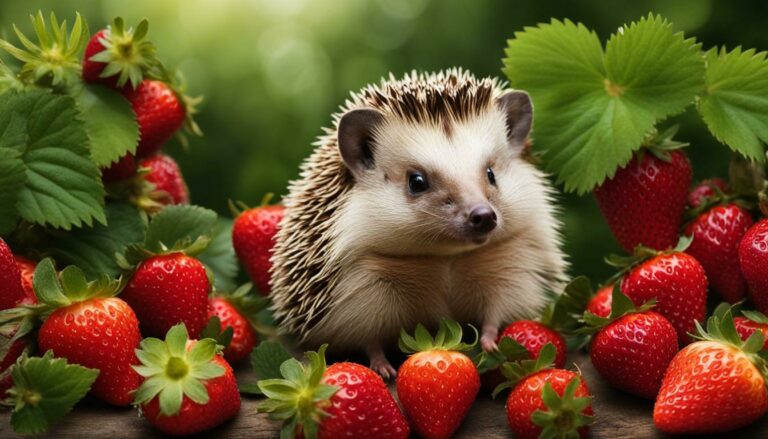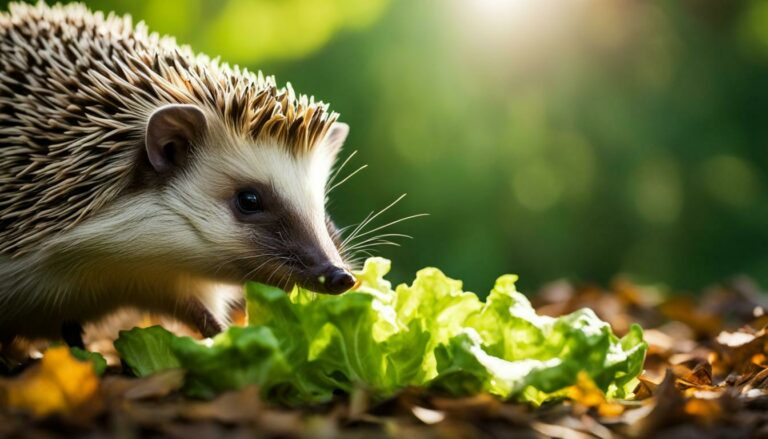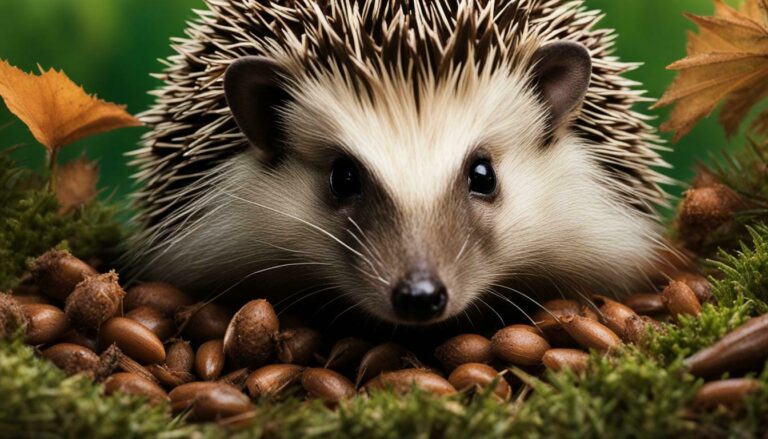Can Hedgehogs Eat Oranges? Essential Diet Guide for Pet Owners
Many pet owners wonder if it is safe to feed oranges to their hedgehogs, but understanding the dietary preferences of hedgehogs is crucial for their overall health and well-being. While hedgehogs love a tasty treat from time to time, not all fruits and vegetables are suitable for their diet. In this essential diet guide, we will explore whether hedgehogs can eat oranges, the importance of a balanced hedgehog diet, recommended fruits for hedgehogs, and other considerations for their overall nutritional requirements.
Key Takeaways:
- Oranges are not toxic to hedgehogs, but their high acid content can cause digestive problems and mouth sores.
- Hedgehogs have specific dietary preferences and rely on a balanced diet for optimal health.
- High-quality hedgehog food should be the main portion of their diet, supplemented with gut-loaded insects and small servings of fresh fruits and vegetables.
- Recommended fruits for hedgehogs include apples, pears, bananas, berries, melons, and kiwi.
- Avoid feeding hedgehogs citrus fruits, grapes, avocados, and dried fruits.
- Choose organic fruits whenever possible to minimize exposure to pesticides and chemicals.
- Always wash fruits thoroughly before feeding them to hedgehogs and cut them into small, bite-sized pieces to prevent choking.
The Importance of a Balanced Hedgehog Diet
A balanced diet is essential for the overall health and longevity of hedgehogs, and incorporating fruits and vegetables into their diet can provide important nutrients and variety. While hedgehogs are natural hunters and primarily eat small invertebrates like slugs, beetles, earwigs, and worms, they can also benefit from a diverse diet that includes high-quality hedgehog food, gut-loaded insects, and small servings of fresh fruits and vegetables.
The Role of Fruits in a Hedgehog’s Diet
Fruits can be a nutritious addition to a hedgehog’s diet, offering vitamins, minerals, and antioxidants. However, it is important to feed fruits in moderation due to their high sugar content. Some safe fruit options for hedgehogs include apples, pears, bananas, blueberries, strawberries, and watermelon. When feeding fruits, it is essential to select organic varieties to avoid exposing hedgehogs to pesticides and other harmful chemicals.
| Safe Fruits for Hedgehogs |
|---|
| Apples |
| Pears |
| Bananas |
| Blueberries |
| Strawberries |
| Watermelon |
It is important to note that while fruits can provide nutritional benefits, they should not make up the majority of a hedgehog’s diet. Too much fruit can lead to obesity, diabetes, and other health issues. Hedgehogs should primarily be fed high-quality hedgehog food, supplemented with small amounts of gut-loaded insects and fresh fruits and vegetables.
When introducing fruits into a hedgehog’s diet, it is crucial to start with small portions and observe their reaction. Some hedgehogs may have individual preferences and may not enjoy certain fruits. It is essential to cut the fruits into small, bite-sized pieces to prevent choking hazards. Additionally, fruits should be thoroughly washed to remove any potential contaminants before feeding.
A balanced diet is key to maintaining the health and well-being of hedgehogs. By providing a variety of foods, including high-quality hedgehog food, gut-loaded insects, and small servings of fruits and vegetables, pet owners can ensure that their hedgehogs receive the necessary nutrients for optimal health. It is important to consult with a veterinarian experienced in hedgehog care for specific dietary recommendations and guidelines.
Can Hedgehogs Eat Oranges?
While oranges may be a healthy and delicious fruit for humans, it is important to understand the potential risks and considerations when it comes to feeding oranges to hedgehogs. Hedgehogs have specific dietary preferences and nutritional requirements that need to be met in order to keep them healthy and thriving.
Oranges are not toxic to hedgehogs, but they should be avoided due to their high acid content. Too much acid can cause digestive problems and mouth sores in hedgehogs, which can be uncomfortable and potentially harmful to their health.
It is best to stick to a diet that closely resembles a hedgehog’s natural diet in the wild. Hedgehogs are primarily insectivores and prefer to eat small invertebrates such as slugs, beetles, earwigs, millipedes, caterpillars, and worms. They also supplement their diet with occasional eggs. To replicate their natural diet, hedgehog owners should provide them with high-quality hedgehog food from the pet store, gut-loaded insects, and small servings of fresh fruits and vegetables.
| Fruits that are Safe for Hedgehogs |
|---|
| Apples |
| Pears |
| Bananas |
| Berries (Blueberries, strawberries, raspberries) |
| Cherries (Pit and stem removed) |
| Figs |
| Melon |
| Papaya |
| Pumpkin |
| Kiwi |
| Watermelon |
| Peaches |
| Mango |
| Squash |
| Cranberry |
It is important to note that fruit should be given in moderation as too much fruit can lead to obesity and other health issues in hedgehogs. Additionally, it is crucial to avoid feeding hedgehogs fruits that are unsafe for them, such as citrus fruits, grapes, and dried fruits. These fruits can be harmful to their digestive system and overall health.
By providing a balanced and appropriate diet for hedgehogs, owners can ensure that their pets stay healthy and happy. It is always best to consult with a veterinarian or a hedgehog expert to get specific guidance on the dietary needs of hedgehogs and to ensure that their nutritional requirements are met.
Recommended Fruits for Hedgehogs
While oranges may not be suitable for hedgehogs, there are numerous other fruits that can be safely incorporated into their diet, providing both nutrition and variety. Hedgehogs have a natural preference for small invertebrates, but they can also enjoy the occasional serving of fresh fruits. Here is a list of recommended fruits for hedgehogs:
- Apples: Remove the skin and seeds, and cut the fruit into small pieces.
- Pears: Remove the skin and cut into small pieces.
- Bananas: Give a small piece and monitor for choking or excessive consumption.
- Berries: Blueberries, strawberries, and raspberries can be given one at a time and cut into small pieces to prevent choking.
- Cherries: Remove the pit and stem before offering in small amounts.
- Figs, melon, papaya, pumpkin, kiwi, watermelon, peaches, mango, squash, and cranberry can also be given in small amounts.
It’s important to introduce fruits gradually and monitor your hedgehog’s response to each type. Some hedgehogs may have individual preferences, so it may take some experimentation to find the fruits they enjoy. Remember to always remove any pits, seeds, or skin that may present a choking hazard.
When feeding fruits to your hedgehog, it’s essential to consider their overall diet. Fruits should only be given as treats or supplements to their main diet, which should primarily consist of high-quality hedgehog food. Too much fruit can lead to obesity and other health issues, so portion control is crucial.
| Fruits to Avoid |
|---|
| Oranges |
| Limes |
| Raisins |
| Grapes |
| Applesauce |
| Watermelon rind |
| Lemons |
| Pineapple |
| Dried fruits |
| Avocado |
It’s important to avoid feeding hedgehogs these fruits as they can be either too acidic, toxic, or pose a choking hazard. Additionally, it’s recommended to select organic fruits whenever possible to reduce the intake of pesticides and chemicals that can be harmful to hedgehogs.
By providing a variety of safe and nutritious fruits, you can enhance your hedgehog’s diet and offer them healthy treats that they will enjoy. Remember to always feed fruits in moderation and prioritize their main diet of high-quality hedgehog food for optimal health and well-being.
Other Considerations for Hedgehog Diet
In addition to fruits, hedgehogs require a well-rounded diet that includes high-quality hedgehog food, gut-loaded insects, and careful portion control to meet their nutritional needs. While fruits can be a tasty and healthy treat for hedgehogs, it’s important to feed them in moderation due to their high sugar content. Here are some other important considerations to keep in mind when it comes to your hedgehog’s diet:
Gut-Loaded Insects
Hedgehogs are natural hunters and thrive on a diet that includes insects. However, it’s crucial to feed them gut-loaded insects. Gut-loading involves feeding insects a nutritious diet so that they, in turn, provide optimal nutrition to your hedgehog. Options such as mealworms, crickets, and waxworms are popular choices for hedgehog owners. Make sure to purchase live insects from reputable sources to ensure they are free from bacteria and parasites.
High-Quality Hedgehog Food
A high-quality hedgehog food should make up the majority of your hedgehog’s diet. Look for a commercially available hedgehog food that contains a balance of protein, fat, and fiber. Avoid foods that contain excessive fillers, artificial ingredients, or high levels of sugar. Always read the labels carefully and choose a food specifically formulated for hedgehogs to meet their unique nutritional requirements.
Portion Control
Portion control is essential to prevent obesity and maintain a healthy weight for your hedgehog. Hedgehogs have a tendency to overeat, so it’s important to monitor their food intake. Follow the recommended guidelines provided by the manufacturer of your hedgehog food and consult with a veterinarian to determine the appropriate portion size for your individual hedgehog. Avoid feeding your hedgehog too many treats or large quantities of fruits and vegetables to prevent digestive issues and weight gain.
By providing a balanced diet of high-quality hedgehog food, gut-loaded insects, and practicing portion control, you can ensure that your hedgehog receives optimal nutrition to support its overall health and well-being.
| Fruits | Serving Guidelines |
|---|---|
| Apples | Remove skin and seeds, cut into small pieces |
| Bananas | Give small piece, monitor for choking hazard |
| Blueberries | Offer one berry at a time, cut into smaller pieces |
| Strawberries | Feed in moderation, cut into small pieces |
| Watermelon | Remove seeds and rind, serve in small amounts |
Remember, always consult with a veterinarian knowledgeable about hedgehog care to ensure you are providing the best diet for your specific hedgehog’s needs. With the right balance of foods, your hedgehog can thrive and enjoy a healthy and happy life.
Conclusion
In conclusion, while hedgehogs should not be fed oranges due to their high acid content, there are many other fruits and vegetables that can be safely incorporated into their diet to ensure they receive the necessary nutrition for optimal health and well-being.
Hedgehogs have specific dietary preferences, and it’s important for pet owners to provide a balanced diet that meets their nutritional requirements. A hedgehog’s diet should primarily consist of high-quality hedgehog food, which can be supplemented with gut-loaded insects and small servings of fresh fruits and vegetables.
When it comes to fruits, hedgehogs can enjoy a variety of options, including apples, pears, bananas, berries, melons, and kiwi. These fruits should be served in small, bite-sized pieces and should be organic to minimize exposure to pesticides and other chemicals.
However, there are also fruits that should be avoided, such as citrus fruits, grapes, avocados, and dried fruits. These fruits can be harmful to hedgehogs and may cause digestive issues or other health problems.
It’s important for hedgehog owners to be mindful of portion sizes and not overfeed their pets with fruits or any other food. Too much fruit can lead to obesity, diabetes, and other health issues in hedgehogs. Moderation is key when incorporating fruits into a hedgehog’s diet.
By following these guidelines and providing a balanced diet, hedgehog owners can ensure that their pets receive the necessary nutrition for a healthy and fulfilling life.
FAQ
Q: Can hedgehogs eat oranges?
A: While oranges are not toxic to hedgehogs, their high acid content can cause digestive problems and mouth sores. It is best to avoid feeding oranges to hedgehogs.
Q: What fruits are safe for hedgehogs to eat?
A: Hedgehogs can safely eat fruits such as apples (without the skin and seeds), pears (without the skin), bananas (in small amounts), berries (cut into small pieces), cherries (without the pit and stem), figs, melon, papaya, pumpkin, kiwi, watermelon, peaches (without the skin), mango, squash, and cranberries.
Q: What fruits should hedgehogs avoid?
A: Hedgehogs should avoid eating citrus fruits (oranges, lemons, limes), grapes, raisins, pineapple, dried fruits, and avocados.
Q: How often should hedgehogs be given fruit?
A: Fruit should be given to hedgehogs in moderation as treats, not as a main part of their diet. Too much fruit can lead to obesity and other health issues.
Q: What is the importance of a balanced hedgehog diet?
A: A balanced diet is crucial for the overall health and well-being of hedgehogs. It should include a combination of high-quality hedgehog food, gut-loaded insects, and small servings of fresh fruits and vegetables.
Q: What are the nutritional requirements of hedgehogs?
A: Hedgehogs require a diet high in protein and low in fats. Their diet should consist of approximately 34% to 35% proteins and 12% to 15% fats. It is important to monitor their weight and regulate their food intake to prevent obesity.
